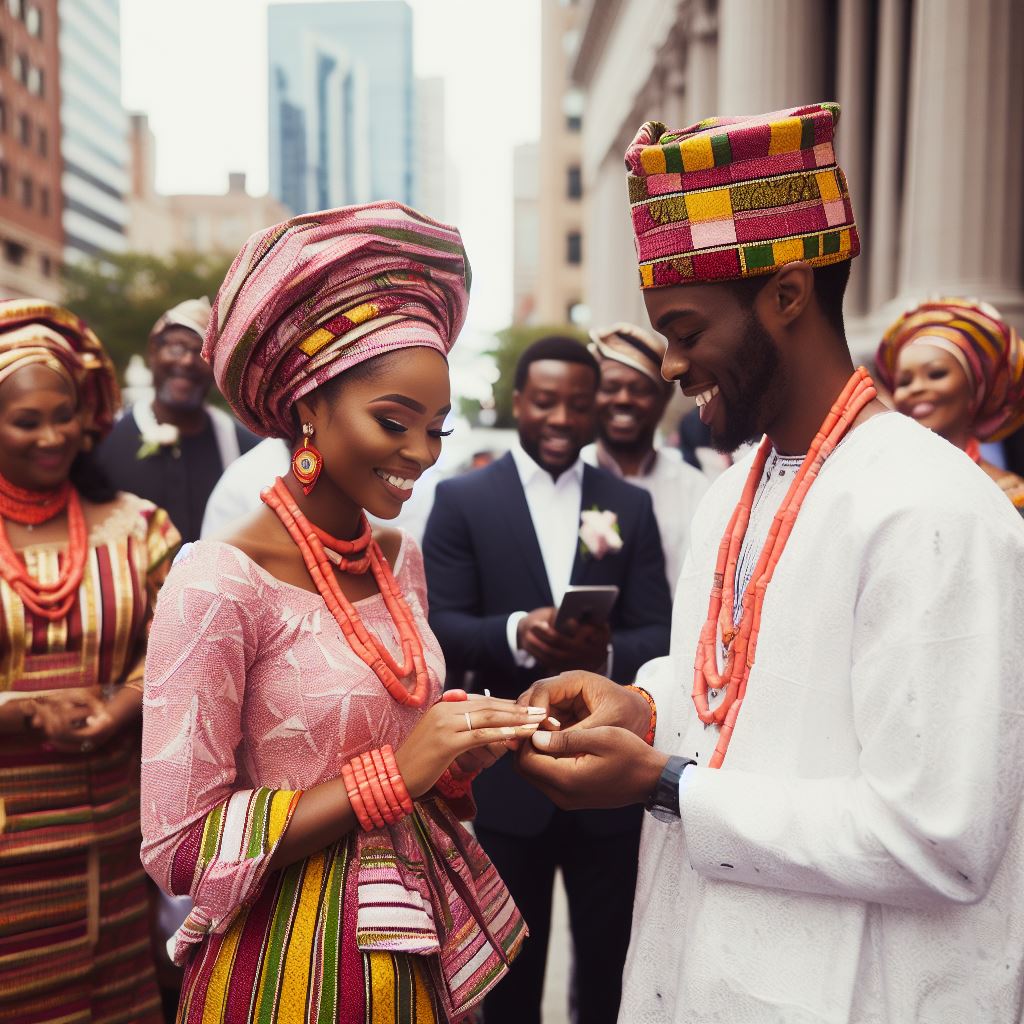The Legal Requirements of a ‘Marriage by Ordinance’ in Nigeria
Last Updated on October 19, 2023
Introduction
Nigeria, a country with a diverse culture and customs, recognizes several types of marriages.
These include Islamic, Customary, and Statutory marriages.
Each type of marriage has its own legal requirements and implications.
However, this blog post will specifically explore the legal requirements of a “Marriage by Ordinance” in Nigeria.
A “Marriage by Ordinance” refers to a wedding solemnized under the provisions of a particular marriage ordinance.
This type of marriage falls under the jurisdiction of a specific law, such as the Marriage Act or the Matrimonial Causes Act, depending on the region.
It is important for couples seeking this form of marriage to be aware of the legal requirements involved.
To have a valid “Marriage by Ordinance” in Nigeria, certain conditions must be met.
These include the age requirement, where both parties must be at least 21 years old.
Consent is essential, as both parties should willingly and freely enter into the marriage.
Additionally, certain prohibited relationships, such as parent-child or sibling relationships, should be avoided.
The ceremony must be conducted by a recognized marriage officer and witnessed by at least two people.
Both parties must provide necessary documents, such as birth certificates, proof of single status, and valid identification.
After the wedding, a marriage certificate will be issued as evidence of the legally recognized union.
Basically, a “Marriage by Ordinance” in Nigeria entails specific legal requirements, including age, consent, and documentation.
Couples intending to marry under this category must understand and fulfill these requirements to ensure a legally recognized union.
Definition of “Marriage by Ordinance”
Explanation of Marriage Act and its significance
In Nigeria, a “Marriage by Ordinance” refers to a marriage that is conducted according to the provisions of the Marriage Act.
The Marriage Act is a legislation enacted by the Nigerian government to regulate marriage in the country.
The significance of the Marriage Act lies in its comprehensive legal framework, which ensures that certain requirements are met before a marriage can be considered valid.
This includes the age and consent of the parties involved, as well as other conditions such as not being closely related by blood or marriage.
One of the key advantages of a Marriage by Ordinance is that it provides legal recognition and protection to both parties.
It establishes clear rights and obligations, ensuring that spouses have legal support in case of any disputes or issues that may arise during the course of their marriage.
Comparison with other types of marriages in Nigeria
In comparison to other types of marriages in Nigeria, such as Islamic or customary marriages, Marriage by Ordinance offers certain advantages.
For instance, it provides a more standardized and universally accepted form of marriage, which may be advantageous in various legal and administrative matters.
Provides clarity in terms of the legal status of the spouses
Marriage by Ordinance also provides clarity in terms of the legal status of the spouses.
It ensures that both parties have equal rights and obligations, regardless of their religious or cultural backgrounds.
This can be particularly significant in cases of divorce or inheritance, where legal recognition and protection are crucial.
Allows for the possibility of a civil ceremony
Furthermore, a Marriage by Ordinance allows for the possibility of a civil ceremony, conducted by a marriage registrar appointed by the government.
This can be seen as a more formal and official way of getting married, as opposed to other types of marriages that may involve more informal or traditional ceremonies.
Certain legal requirements must be fulfilled
In order to have a Marriage by Ordinance, certain legal requirements must be fulfilled.
For instance, both parties must be of a certain age (usually at least 21 years old), they must provide valid proof of identity and residence, and they must give notice of their intention to marry to the marriage registrar.
The Marriage Act requires the presence of at least two witnesses during the marriage ceremony.
These witnesses play a crucial role in validating the marriage and ensuring that all legal requirements are met.
It is important to note that a Marriage by Ordinance may not be suitable for everyone in Nigeria.
Some couples may prefer to opt for Islamic or customary marriages, depending on their religious or cultural beliefs.
The choice of the type of marriage is a personal decision that should be made based on individual circumstances and preferences.
Generally, a Marriage by Ordinance in Nigeria is a legally recognized and regulated form of marriage conducted under the provisions of the Marriage Act.
It provides legal rights and protection to both parties and offers advantages in terms of clarity, standardization, and legal recognition.
The choice of marriage type ultimately depends on individual preferences and circumstances.
Read: Expert Tips for a Smooth ‘Marriage by Ordinance’ Registration Process
Legal age requirements for Marriage by Ordinance
Minimum age for marriage in Nigeria
- The legal age for marriage in Nigeria is 18 years for both males and females.
- Individuals must be at least 18 years old to enter into a marriage by ordinance.
- This age requirement is set to protect the rights and well-being of young individuals.
Exceptions and consent requirements for underage individuals
- Underage individuals below the age of 18 may be allowed to marry, but certain conditions must be met.
- Written consent from the parents or legal guardians is required for underage individuals to marry.
- The consent of the State Minister of Women Affairs or any other relevant authority is also necessary.
- These exceptions are made in exceptional circumstances and aim to prevent harm and protect minors.
Consequences of violating age requirements
- Marrying below the legal age without proper consent is a violation of the law.
- Any person who aids, abets, or facilitates the marriage of underage individuals can face legal consequences.
- Violators may be subjected to fines, imprisonment, or both, depending on the severity of the offense.
- The Nigerian legal system takes underage marriages seriously to ensure the protection of minors.
List of important points regarding legal age requirements for Marriage by Ordinance
- Minimum age for marriage in Nigeria is 18 years for both males and females.
- Underage individuals must obtain written consent from parents or legal guardians.
- The consent of the State Minister of Women Affairs or relevant authority is necessary.
- Exceptions for underage marriages are made in exceptional circumstances.
- Violating age requirements can result in fines, imprisonment, or both.
The legal age requirements for Marriage by Ordinance in Nigeria aim to protect the rights and well-being of individuals.
The minimum age for marriage is set at 18 years for both males and females.
Underage individuals may be allowed to marry with the proper consent of their parents or legal guardians, along with the approval of the State Minister of Women Affairs or relevant authority.
Violating age requirements can lead to legal consequences, including fines, imprisonment, or both.
It is crucial to adhere to these requirements to ensure the safety and protection of minors.
Read: Dealing with Family Pressures: Ordinance vs. Traditional Weddings
Capacity and consent of parties
Mental capacity and understanding of marriage
- Both parties involved in a “Marriage by Ordinance” in Nigeria must possess the mental capacity and understanding of marriage.
- Mental capacity refers to the ability to comprehend the rights, responsibilities, and implications of getting married.
- It is important for individuals entering a marriage to have the mental capacity to make informed decisions.
- Understanding the concept of marriage ensures that both parties are aware of the legal, social, and emotional aspects involved.
- Without mental capacity and understanding, parties may not be fully aware of their rights and obligations within a marriage.
Consent requirement from both parties
- Consent is a fundamental requirement for a valid “Marriage by Ordinance” in Nigeria.
- Both parties must willingly and freely give their consent to enter into a marriage.
- Consent ensures that individuals are entering the marital contract voluntarily and without coercion.
- It is essential for each party to have the capacity to comprehend the implications of giving consent to marriage.
- Without consent from both parties, the marriage may be deemed invalid and voidable under Nigerian law.
Problems related to forced marriages and lack of consent
- Forced marriages are a significant issue affecting individuals in Nigeria.
- A forced marriage occurs when one or both parties are coerced, threatened, or pressured into marrying against their will.
- Lack of consent in a marriage can have severe consequences, including emotional trauma, abuse, and a violation of human rights.
- Forced marriages often result in individuals being trapped in abusive relationships with limited legal options for escape.
- Nigerian law recognizes forced marriages as a violation of human rights and strives to protect individuals from such practices.
Read: Top Venues for ‘Marriage by Ordinance’ Ceremonies in Nigeria
Process for solemnizing a Marriage by Ordinance
Obtaining a marriage license
In order to solemnize a marriage by ordinance in Nigeria, the first step is for the couple to obtain a marriage license.
Notice of marriage and waiting period
After obtaining the marriage license, the couple must give notice of their intention to marry to the marriage registrar.
There is a waiting period of at least 21 days from the date of giving notice before the marriage can be solemnized.
Role of a marriage registrar in conducting the ceremony
The marriage registrar plays a crucial role in conducting the ceremony for a marriage by ordinance.
They are responsible for ensuring that all legal requirements are met and for officiating the marriage ceremony.
Recording and documentation of the marriage
After the marriage ceremony has been solemnized, the marriage registrar is responsible for recording and documenting the marriage.
This includes issuing a marriage certificate to the couple as proof of their legal union.
The marriage registrar must also ensure that the marriage is properly registered with the appropriate government authorities.
Essentially, solemnizing a marriage by ordinance in Nigeria involves several important steps and the involvement of a marriage registrar.
The couple must obtain a marriage license, give notice of their intention to marry, and wait for the required waiting period.
The marriage registrar then conducts the ceremony, ensuring that all legal requirements are met.
After the ceremony, the marriage registrar records and documents the marriage, issuing a marriage certificate to the couple.
It is essential for couples to follow these processes in order to have a legally recognized marriage in Nigeria.
Read: Advantages and Disadvantages of Marriage by Ordinance in Nigeria

Legal obligations and rights of parties after Marriage by Ordinance
Mutual rights and responsibilities of spouses
- Spouses have the right to companionship and support from each other.
- Both parties have an obligation to maintain a healthy and satisfying relationship.
- They must prioritize each other’s well-being and promote a harmonious home environment.
- Spouses should communicate openly and honestly, respecting each other’s opinions and feelings.
- They have a joint responsibility to contribute to the financial stability of the family.
- Both parties should share household chores and childcare duties.
- Spouses have the right to enjoy physical and emotional intimacy within the bounds of consent and respect.
- They should support each other’s personal and professional growth.
- Spouses must make joint decisions regarding major family matters.
- They have a duty to protect each other’s reputation and maintain confidentiality.
Property ownership and sharing under the marriage
- Spouses have equal rights to the property acquired during the marriage.
- All assets, including real estate, vehicles, and investments, are considered joint property.
- Each party has the right to use and enjoy the matrimonial property.
- In case of divorce or separation, the property acquired during the marriage is usually divided equitably.
- Spouses may choose to enter into a prenuptial agreement to determine property ownership.
- Both parties must disclose their assets and liabilities to ensure transparency.
- Debts incurred during the marriage are typically shared between spouses.
- Disputes regarding property ownership can be resolved through mediation or court proceedings.
- Spouses should seek legal advice to understand their rights and obligations regarding property.
Rights and responsibilities towards children born in the marriage
- Both parents have equal rights and responsibilities towards their children.
- They must provide for the child’s physical, emotional, and educational needs.
- Parents should make decisions regarding the child’s well-being jointly.
- They have an obligation to create a loving and supportive environment for their children.
- Parents must maintain regular contact with their children and foster a relationship with them.
- Both parties should financially contribute to the upbringing and welfare of the children.
- In the event of divorce or separation, child custody and visitation rights are determined.
- Parents must respect the child’s rights and protect them from harm.
- Disputes related to child custody or visitation can be resolved through legal proceedings.
- Both parents should prioritize the best interests of the child in all decisions.
Dissolution of Marriage by Ordinance
Grounds for Divorce and Annulment
- In Nigeria, a marriage by ordinance can be dissolved through divorce or annulment.
- Divorce can be granted based on various grounds, including adultery, cruelty, and abandonment.
- Annulment, on the other hand, refers to the declaration that a marriage is null and void.
- Grounds for annulment include underage marriage, bigamy, and lack of consent.
- Both divorce and annulment provide individuals with an opportunity to end their marriages legally.
- These legal provisions ensure fairness, protection, and the pursuit of happiness for married couples.
Legal Procedures and Requirements for Divorce
- Divorce in Nigeria must be initiated by either spouse through a petition filed in court.
- The petitioner must prove the existence of valid grounds to dissolve the marriage.
- The court will then issue a summons to the other spouse, informing them of the divorce proceedings.
- Both parties are given an opportunity to present their case before the court.
- If the court is satisfied with the evidence provided, it may grant a decree of divorce.
- Divorce proceedings must adhere to the legal procedures and timeline set by Nigerian law.
- All parties involved have the right to legal representation throughout the process.
- Divorce certificates are then issued to confirm the dissolution of the marriage.
- These legal procedures ensure transparency and fairness in the divorce process.
Custody, Alimony, and Distribution of Assets in Divorce Cases
- In divorce cases, matters related to child custody, alimony, and distribution of assets are addressed.
- Custody of children is determined based on their best interests and welfare.
- The court considers factors such as the child’s age, health, and parent-child relationship.
- Alimony, also known as spousal support, may be awarded to the financially disadvantaged spouse.
- The amount and duration of alimony depend on various factors, including the length of the marriage.
- Distribution of assets involves dividing marital property and debts between the spouses.
- The court considers factors like contributions to the marriage and future earning capacities.
- These decisions are made to ensure the fair and equitable distribution of resources.
In general, the legal requirements surrounding the dissolution of a marriage by ordinance in Nigeria aim to protect the rights and interests of individuals seeking divorce or annulment.
These legal provisions ensure that the process is fair, transparent, and based on valid grounds.
The laws address important matters such as child custody, alimony, and distribution of assets, with the objective of providing equitable resolutions and minimizing the negative impact on parties involved.
By adhering to these legal procedures, individuals can effectively terminate their marriages within the framework of Nigerian law.
Conclusion
A recap of the key points discussed in this blog post
- Marriage by Ordinance is a legal type of marriage in Nigeria.
- It requires compliance with specific legal requirements.
- The couple must give notice to the marriage registrar.
- There should be no lawful impediments to the marriage.
- The marriage ceremony must be conducted within three months of the notice.
- Two witnesses must be present at the ceremony.
- The marriage certificate will be issued after the ceremony.
- Couples need to register their marriage with the appropriate authority.
Understanding the legal requirements of Marriage by Ordinance in Nigeria is important because
- It ensures compliance with the law and avoids potential legal issues.
- It provides legal recognition and protection for the marriage.
- It enables couples to access legal benefits and rights associated with marriage.
- It gives couples the ability to dissolve the marriage through legal means, if necessary.
- It establishes a clear framework for the rights and responsibilities of the spouses.
In essence, couples intending to enter into Marriage by Ordinance in Nigeria should be aware of the legal requirements to ensure a valid and recognized marriage.
By understanding and fulfilling these requirements, couples can establish a legally binding union with the associated benefits and protections provided by the law.


